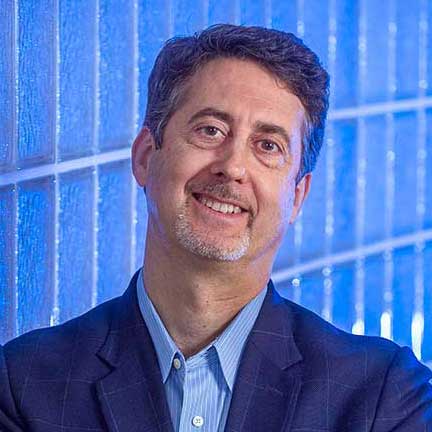
Joseph B. Schlenoff, a world-renowned pioneer in the creation of thin films though polymer science, has been named the 2016-2017 Robert O. Lawton Distinguished Professor, the highest honor given by the Florida State University faculty to one of its own.
“As the widely recognized world leader in the layer-by-layer assembly of novel chemical surfaces known as thin films, Joe Schlenoff has significantly contributed to materials research and we are exceptionally proud to name him this year’s Lawton Distinguished Professor,” said FSU President John Thrasher.
Schlenoff is the Leo Mandelkern Professor of Polymer Science in the Department of Chemistry and Biochemistry in the College of Arts and Sciences.
“Knowing the caliber of past and present faculty of this great university, I am humbled and honored to be selected by my colleagues for such a distinction,” Schlenoff said.
Using alternately stacked layers of polymers containing an excess of either negatively or positively charged atoms, Schlenoff essentially builds polymer “sandwiches.” These ultra-thin polymer coatings, similar to those found in shampoo, can be engineered with tailored properties for a range of applications and are useful for creating biocompatible surfaces that can be implanted into the human body.
“Joe is known internationally for the fundamental physical and polymer science behind these coatings, or thin films,” said Alan G. Marshall in a letter supporting Schlenoff’s nomination. Marshall is the chief scientist of the Ion Cyclotron Resonance Program at the National High Magnetic Field Laboratory and the 2006-2007 Robert O. Lawton Distinguished Professor.
Schlenoff’s work is highly creative, very novel and has tremendously important practical applications, according to Timothy M. Logan, professor and chair of the Department of Chemistry and Biochemistry.
“Joe has used these materials to show how normal medical tubing can be coated to support cell growth, which might find applications in the engineering of new blood vessels or other types of tissues in the human body,” Logan said in a letter supporting Schlenoff’s nomination.
Schlenoff’s approach to research combines fundamental chemical insights with the knowledge of polymer synthesis to make new chemicals with interesting and important biological properties that can address pressing societal needs, according to Logan.
Schlenoff also has pioneered the development of “saloplastics,” where he uses salt instead of heat to “melt” plastics made from blends of charged polymers.
“I have seen speakers at international meetings refer to Joe’s novel ideas and findings as an inspiration for their own work, and that is quite remarkable,” said Hedi Mattoussi, a professor of physical chemistry and nanoscience in the Department of Chemistry and Biochemistry.
Schlenoff has spent his entire professional career at Florida State, starting as assistant professor in 1988. He became associate professor in 1993 and full professor in 1997. In 2004, he became the Mandelkern Professor of Polymer Science. In 2011, he held a Gutenberg Chair at the University of Strasbourg, France.
As an administrator, Schlenoff served as the associate director of the university’s Center for Materials Research and Technology (MARTECH) from 1996 to 2006. His success as chair of the Department of Chemistry and Biochemistry from 2007 to 2011 and as chair of its New Building Committee are still evident today.
“FSU now boasts an outstanding, state-of-the-art chemical sciences research facility that has helped to attract, nurture and retain exceptional talent — particularly an amazing cohort of young, active and successful chemistry researchers,” said Sir Harry Kroto, FSU’s Francis Eppes Professor of Chemistry and co-recipient of the 1996 Nobel Prize in chemistry, in a letter supporting his nomination.
Kroto also praised Schlenoff’s infectious enthusiasm as department chair for contributing to the “very pleasant” environment that fosters excellent research.
Schlenoff’s influence reached across the Florida State campus in a collaboration with Jim Dever, entrepreneur-in-residence at the Jim Moran lnstitute in the FSU College of Business, to establish the ChemPreneurs program in 2008. The program pairs entrepreneurship students from the College of Business with students and faculty from the Department of Chemistry and Biochemistry to develop commercialization plans for technologies developed in the laboratory.
Schlenoff’s research has influenced the field of polymer science around the world. Frank Caruso, professor and ARC Australian Laureate Fellow in the Department of Chemical and Biomolecular Engineering at the University of Melbourne, commended Schlenoff for his more than 125 peer-reviewed articles and more than 46 proceedings/book chapters that have been cited more than 7,000 times by other researchers.
“These accomplishments point to a highly interdisciplinary and creative body of work, which shows the breadth and depth of Professor Schlenoff’s knowledge and expertise as a scientist,” Caruso said in a letter supporting his nomination.
Schlenoff influences global research in a practical sense as president and CEO of nanoStrata Inc., a company formed in 2000 to commercialize technology developed at FSU. The company specializes in robotics that automate the tedious work involved in multilayer research.
Schlenoff earned a Bachelor of Science with honors in chemistry from the University of Bristol, England, in 1980. After working for Polaroid Corp. in Boston, he earned a Master of Science and a doctorate in chemistry from the University of Massachusetts in 1985 and 1987, respectively. He served as a postdoctoral associate in the University of Massachusetts’ Department of Polymer Science and Engineering.
Schlenoff holds 36 patents, with many more pending. He is a fellow of the American Association for the Advancement of Science. He serves as senior editor of Langmuir, a publication of the American Chemical Society, of which he is a member.
Schlenoff has directed the studies of eight master’s students and 27 doctoral students.
The Lawton Distinguished Professor Award was first presented in 1957. The award was known as the Distinguished Professor Award until 1981 when it was re-named in honor of the late Vice President for Academic Affairs Robert O. Lawton. At that time past recipients also were designated Lawton Distinguished Professors.
Schlenoff is the 11th member of his department to be named a Robert O. Lawton Distinguished Professor. To view a list of all Lawton Distinguished Professors, visit https://provost.fsu.edu/faculty/awards/distinguished-professor/.




